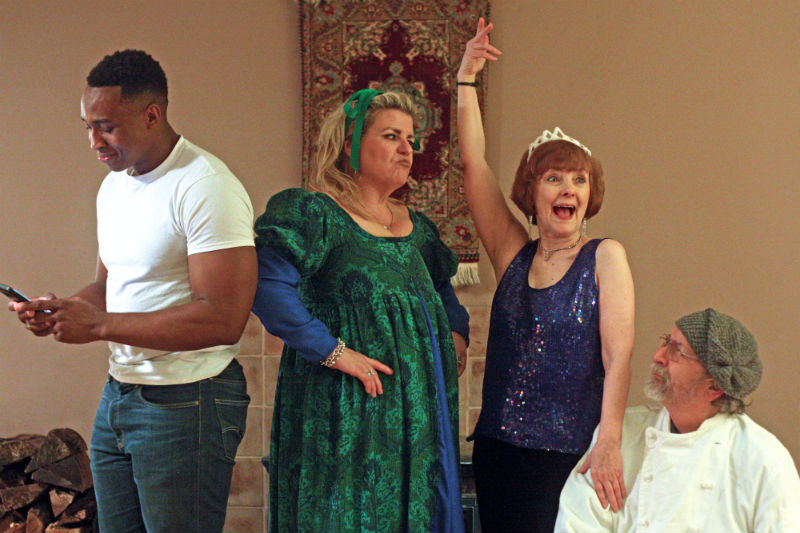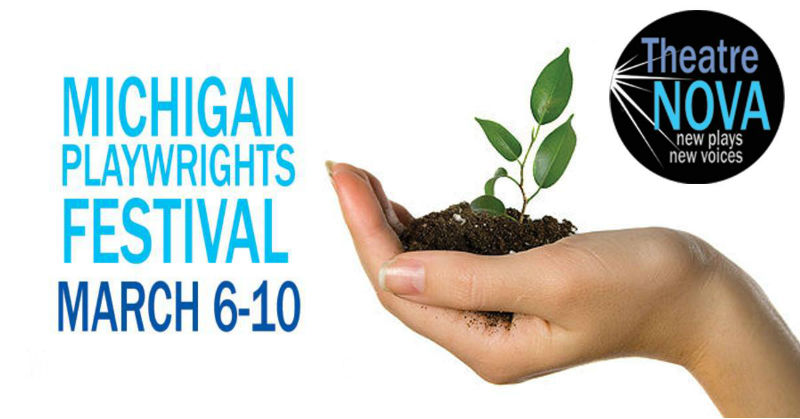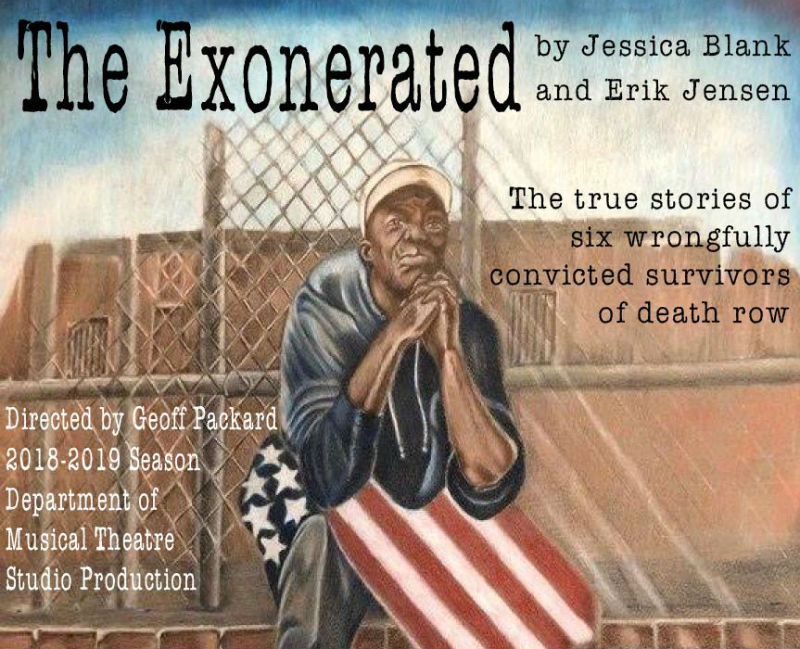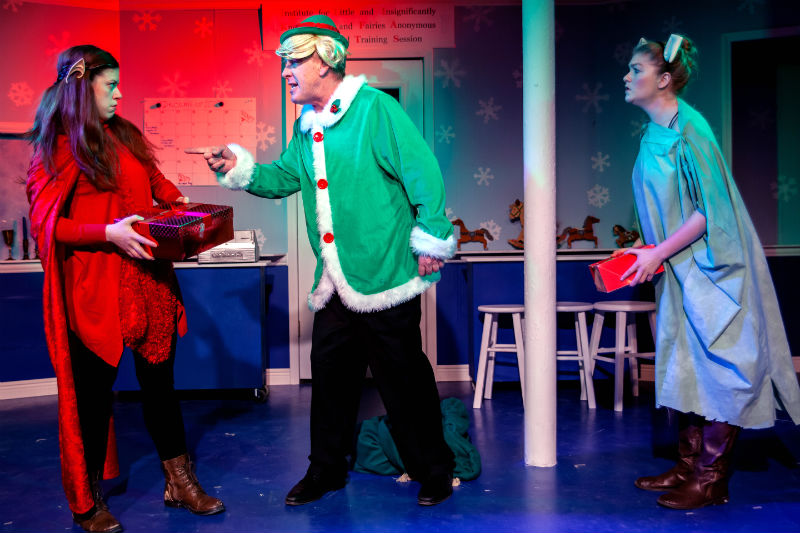Theatre Nova’s "Mazel Tov, John Lennon" engages with an odd couple true story

In 1972, John Lennon and Yoko Ono sought help from an immigration lawyer to extend their visas by six months so that Ono could continue to make her case in custody proceedings for her 8-year-old daughter.
They were put in touch with a mild-mannered, admittedly “square” immigration lawyer who had never heard of John Lennon, though he did know a little about The Beatles. Leon Wildes would find himself drawn into the muck and mire of the Nixon administration, a landmark immigration case, and a friendship with the mercurial, brilliant, and troubled rock star, cultural icon, and political activist.
Theatre Nova is presenting the world premiere of Mazel Tov, John Lennon, David Wells’ engaging take on this true story of an odd couple who became friends in a fight against government oppression.
Civic Theatre’s "Vanya" finds humor in sibling rivalry and Chekhov

Siblings always have issues.
Sometimes the older they get the testier they become, especially when their paths diverge.
This idea became the inspiration for Christopher Durang’s Tony Award-winning play Vanya and Sonia and Masha and Spike, a comedy about sibling resentments that takes some inspiration from Russian short-story writer and playwright Anton Chekhov.
Cassie Mann, who is directing a production of Vanya for the Ann Arbor Civic Theatre, March 14-17, said she fell in love with the play when she read it.
Theatre Nova’s Playwrights Festival lets the audience help writers find their voice

Playwrights begin with an idea. They imagine a setting, develop a cast of characters, and write a script. But that’s just the beginning. A director and actors will breathe life into the writer’s words. Only then can a writer get a feel for whether his or her play hits its mark.
That’s where the semi-annual Michigan Playwrights Festival at Theatre Nova provides an important service to playwrights and a great opportunity for theatergoers to see an original play in its infancy.
“Playwrights tell us how valuable it is to hear their play read out loud by professional actors in front of an audience,” said Diane Hill, producing artistic director of Theatre Nova, in an email interview. “They can see if what they thought was funny actually receives laughs or if what they thought might be a poignant moment falls flat. They also listen to the audience discussion that follows the reading concerning its positives and negatives which can sometimes lead to script alterations.”
Five new plays by Michigan playwrights will be presented March 6-10 in staged readings at Theatre Nova in Ann Arbor.
U-M Musical Theatre offers hard-hitting drama "The Exonerated"

The acting students at the University of Michigan’s Department of Musical Theatre will be shifting gears to perform in The Exonerated, a docudrama that reveals serious problems in the United States criminal system.
The Exonerated by Jessica Blank and Erik Jensen tells the true stories of six wrongfully accused convicted survivors of death row in their own words. The script was prepared from interviews, letters, transcripts, case files, and the public record.
Encore Theatre presents an emotionally taut staging of “Next to Normal”

Bipolar disorder is not the usual musical fare. But the Tony- and Pulitzer Prize-winning musical Next to Normal joins such recent topical musicals as Avenue Q, Rent, Dear Evan Hansen, and Hamilton as a forum for dealing with current issues using music and words to drive home tough lessons.
The Encore Theatre production of Next to Normal, with music by Tom Kitt and book and lyrics by Brian Yorkey, will not send you home whistling a tune, but it will leave you with a better understanding of the pain, confusion, and challenges faced by those with bipolar disorder and the family and friends around them.
Theatre Nova's annual panto gets goofy for Hanukkah with "The Elves and the Schumachers"

In England, the panto (short for pantomime) is a Yuletide tradition. A familiar fairy tale is retold as an excuse for a light-hearted vaudeville of jokes, well-worn comic routines, and song and dance.
Theatre Nova has adopted the idea as an annual holiday treat. This year a new take on The Elves and the Shoemaker gets reimagined into a Jewish-centered The Elves and the Schumachers, just in time for Hanukkah.
The plot of Carla Milarch and R. MacKenzie Lewis’ retelling keeps to the basics: elves help a desperate shopkeeper and save the day. But, oy vey, do they wander far and wide into the surreal and the totally silly.
Encore’s "Hello, Dolly!" is still looking swell

After all these years the adventures of New York City matchmaker Dolly Gallagher Levi are still going strong.
Dolly is now working her magic at the Encore Musical Theatre, where Hello, Dolly!’s jaunty style, catchy title song, and lively dances make it the perfect sprightly bauble for the coming holiday season.
Hello, Dolly! was a hit right from the start. The original 1964 New York production starring Carol Channing became the longest running musical on Broadway up to that time, with numerous leading ladies filling the role that Channing made famous. The title song became a mega-hit record for Louis Armstrong, briefly toppling The Beatles from the top of the charts. The musical has been revived numerous times on Broadway, most recently last year with a smash hit staging starring Bette Midler.
U-M’s "Passing Strange" follows a rocking journey of discovery

In the late 1970s, a young African-American with musical ambitions left his strict religious home in Los Angeles to set out on a journey to discover who he was, what he believed and where he belonged.
Years later, the rock songwriter and musician known as Stew turned his story of self-discovery into the unusual and critically acclaimed musical Passing Strange. The musical, with book and lyrics by Stew, and music by Stew and a former bandmate, Heidi Rodewald, received seven 2008 Tony Award nominations and Stew won the award for best book. Passing Strange also won the Drama Desk Award for outstanding musical.
His story resonated with those who lived during those years and it resonates still with young audiences, which makes it a perfect vehicle for young actors. The University of Michigan Department of Musical Theatre will present Passing Strange Nov. 15-18 at the Arthur Miller Theatre.
It’s the words that are scary in Brass Tack’s "Blithe Spirit"

Ghouls, goblins, zombies, and ghosts.
Ooooh scary
Well, not all ghosts are scary.
Take Noel Coward’s Blithe Spirit. The ghost is mischievous but also charming. What is scary is the sarcasm that the characters hurl back and forth at each other.
Brass Tacks Ensemble will present Coward’s humorous take on all things ghostly Nov. 2-4 and 9-11 under the direction of Aaron C. Wade.
“It’s a haunted tale with a little bit of comedy and it’s that time of the season for a ghost story,” said Wade. “It a fun challenge to do this sort of theater.”
Theatre Nova’s "Stone Witch" meditates on elusive creativity

Theatre Nova continues a season of World and Michigan premieres with the first Michigan staging of Shem Bitterman’s meditation on creativity, ambition, and aging, The Stone Witch.
The title refers to a children’s book by a young but struggling children’s book author and illustrator. Peter Chandler has the talent but is unable to sell himself or his cherished first book, based on an old folktale told by his mother.
An editor at a prestige publisher offers Chandler a deal. They’ll consider his book if he can help them encourage their famous star children’s book writer and illustrator to finally break through and end a 12-year-long creative block.


































